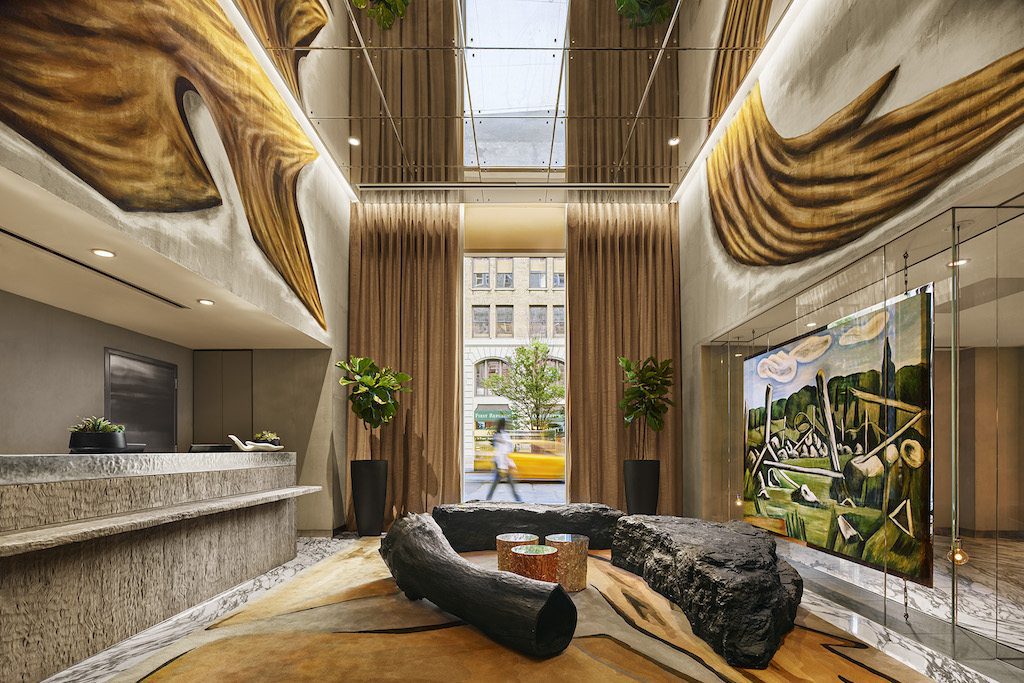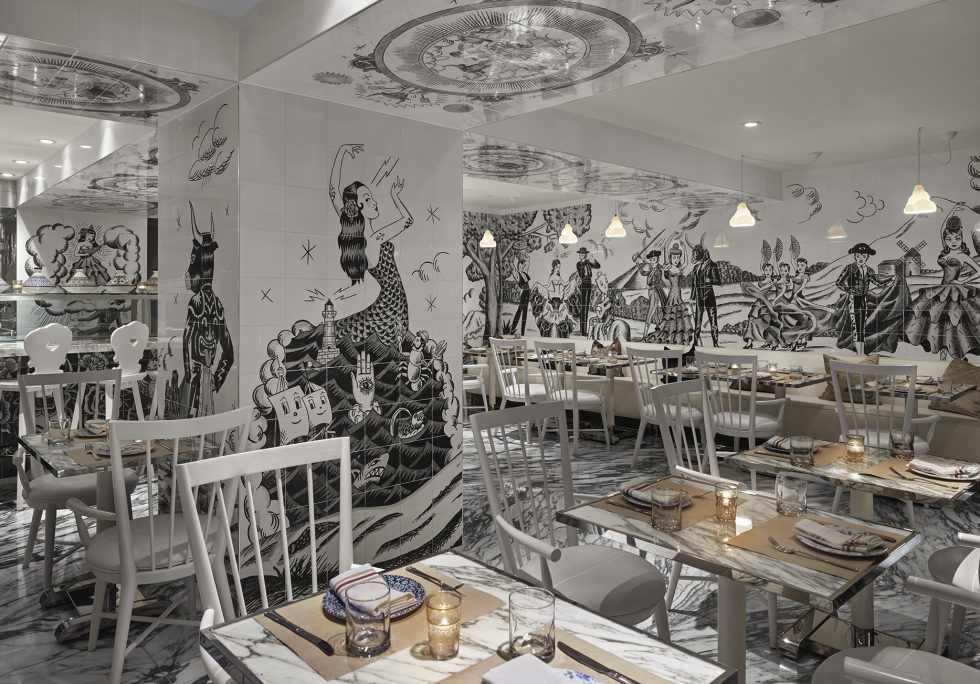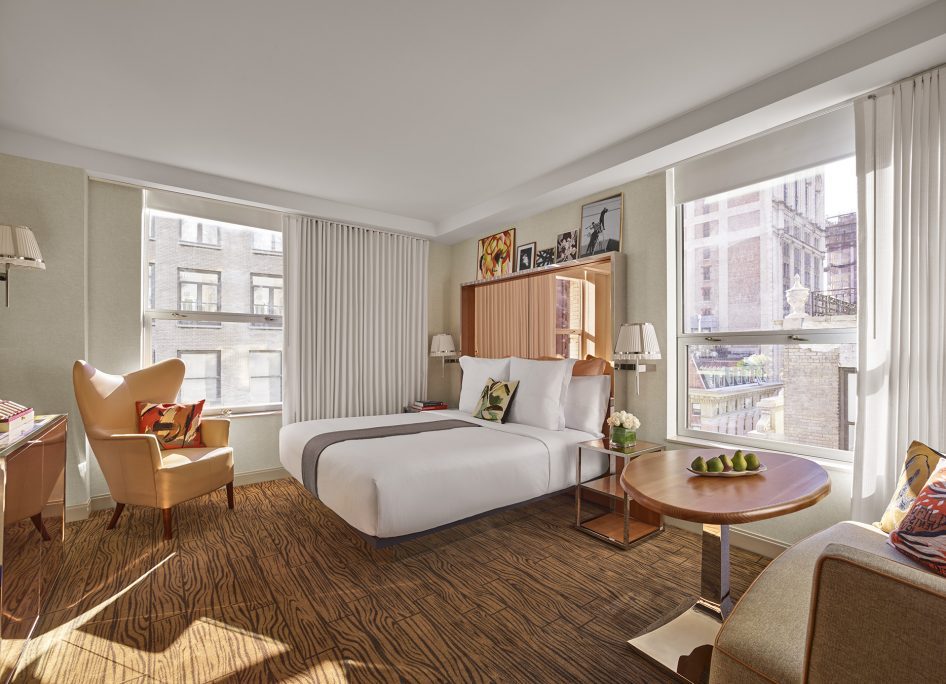CEO Interview: Veteran Hotelier Stephen Brandman on Reinventing Lifestyle Hotel Management

Skift Take
Stephen Brandman has a more than 30-year history of working in the hotel industry, including co-founding Thompson and Commune Hotels and working for more than 16 years for InterContinental Hotels Group.
In 2017, he made news again with the announcement that he would lead a new hotel management company, Journal Hotels, which was started by Goodwin Gaw and David Chang, the owners of The Hollywood Roosevelt hotel.Journal Hotels' U.S. portfolio includes The Hollywood Roosevelt, The Standard High Line, the newly opened Mondrian Park Avenue, the Ambassador Chicago (formerly known as the Public Chicago), Two Bunch Palms, and the Hotel G.
With Journal Hotels, Brandman sees an opportunity to reinvent the business model of a lifestyle hotel company, and Skift recently spoke to the CEO about that model, as well as where he sees the future of boutique and lifestyle hospitality.
On What He's Doing Differently With Journal Hotels
"What I am trying to accomplish is, in years' past I founded and owned several different companies like Thompson Hotel, and Commune Hotels and things like that. This time around, what I am really trying to do is I'm not necessarily trying to create a brand," Brandman said. "What I am trying to do is create a collection of lifestyle hotels. In years past, it was always about finding a project that had certain specific thing and then trying to brand it with the company name. And this time around, I'm not looking to do that. I'm looking to create a collection of lifestyle hotels where we can do multiple things. We can either own it, we ask to manage it, we could offer revenue management services — so there are a whole lot of things that we can do to help add value to a particular asset, as long as it lays in the lifestyle world."
Brandman sees Journal Hotels as a lifestyle-focused collection of hotels, both branded and independent, where his company can work on assets to varying degrees.
"I think what we're doing at Journal Hotels, what I'm trying to accomplish, is I'm trying to change the paradigm of what hotel companies look like," he added. "In the past, hotel companies looked after their specific name and it was about their branding. The most important thing was their branding. And what I'm trying to do is I'm trying to offer services to maximize the value to the owners of assets. If we feel like the best use of the property on 30th and Park Ave is to make it a Mondrian hotel, then I feel it's best to license it from Sam [Nazarian, CEO of SBE], bring him up to speed, and to operate the property ourselves."
The Mondrian Park Avenue, which opened in the fall of 2017 in New York City, was originally slated to be an SLS hotel, but Brandman said that, "for several reasons, the ownership of the hotel wanted to look at some other options."
"That's when ownership and I sat down with SBE and said, 'What really would be the best use of this development? Because of the international flavor of Park Avenue and being right there in Midtown New York, in the NoMad district, we thought, hey listen, what would be great is to create a Mondrian there.' I'm not looking to call that Journal New York or Journal Park Avenue. I'm looking at how can I help ownership operate a property there that is profitable and gets the appropriate attention to make that something special. That's when I decided to license the name Mondrian from SBE and manage that ourselves on behalf of the ownership group, which is the Moinian Group."
He added, "I think it's kind of a win-win for everyone, in a sense that SBE has a great property right there in the heart of the NoMad district of New York. It helps the Mondrian flag, which helps SBE. We're there to manage that on a day-to-day basis which, obviously, is a benefit to the hotel owner. It's kind of a good partnership that works out. SBE has the ability to grow from different brands and, at the same time, it adds to the collection of lifestyle hotels that I'm creating."
On Defining What Lifestyle Hotels Should Be
The types of lifestyle hotels that Brandman is adding to Journal Hotels' portfolio are also deliberately curated.
"The category of lifestyle hotels is quite broad, right?," he said. "There are two- and three-star brands that are using the term moniker lifestyle hotels, as well as four- and five-star hotels. So, it's a broad term. But I think what we're trying to do at our properties is make sure they reflect the local community that surrounds them. And try to work in a way that it's offering and embrace of the community."
He noted examples of that with the types of restaurants and bars at some of Journal's properties. "It's really about being made invaluable for the local community. We feel that they will embrace it and they will enjoy the offerings that we have and they will use other areas of the hotel, as well, while they're there. It might be the library bar, or it might be some of the art exhibits we plan on showing in the lobby of the hotel. It really is about — not just traveling public — but the local community."
And, he added, not just anyone can create or operate a lifestyle hotel, which is what gives Journal Hotels an advantage, he said. Lifestyle and boutique hotels, he said, are more than just good design.
"So often what happens in the lifestyle space, it means you have people that feel they can either create, through design, something that gives the feeling of lifestyle space," he explained. "Or somebody is deeply involved in the nightclub world or restaurant world or the bar scene, and feels that they can recreate that into the hotel environment."
He continued, "Oftentimes, you go to people that are in the lifestyle space and there's already a predetermined formula that that company thinks works. Right? And I'm saying 'No, I want to be more flexible because communities look different, owners have different desires, owners have a certain set of different exceptions.' I'm not putting my desires and my expectations into the project; I'm listening to what the owners' desires are. Then I go out and try to figure out what the community and traveling public to that area wants. And then we sit back and I help curate that whole experience, then operate it. I think it's more thoughtful. And I think it's more honest. And I think it is less formulaic, which makes it have real integrity. And I thinks that's what makes the properties that I operate feel very real."
Part of that authenticity, he said, is the fact that Brandman and his team share the lifestyles they are adding to the hotels.
"There are a lot of lifestyle brands out there. The challenge is that many of them are corporate driven. Many of them are really one single asset. I live this life and my team lives this life of being lifestyle, so we're always finding out and discovering a great place that might've just opened up in Williamsburg, a little bar or a place to go have oysters, or an interesting art gallery that just opened up. We're living this life and I think the thing that separates us from many companies — not all companies, but most of the lifestyle companies — sometimes become a little formulaic.
"A lot of those are driven by design. Lots of designers now designing lifestyle space. And a lot of nice, beautiful ones. When it comes to operating the business and, remember, we're in the people business at the end of the day, people want to enjoy their experiences; even when they're here for business, they still want to enjoy their experiences. I think what we do here at Journal Hotels is very authentic. It reflects, not a corporate mantra, but it reflects the local community. That's very important."
Brandman credited his experience of working in hotels with helping him have a more holistic understanding of what goes into operating a hotel, and what distinguishes a great lifestyle property from just another hotel down the street.
"What Journal Hotels is, is a more well-rounded option for hotel owners because I provide the traditional understanding of how hotels operate and, at the end of the day, in the heart of the house, you want to make sure the accounting systems work right, and the training systems work right, and the revenue management system works right. That the human resources issues are resolved and handled properly. I come from a very traditional background, or as part of my upbringing. And then I also bring to the table this element of lifestyle. And whether that means the type of restaurants that I put in, or the types of nightlife I curate, or the design I curate, what I think we at Journal Hotels provide is a more well-rounded approach to this lifestyle space."
And that relates to why, with Journal Hotels, Brandman isn't as focused on building a single brand, but on building a variety of different lifestyle experiences that appeal to guests but are also profitable for hotel owners.
"In the hotel world, oftentimes there are a lot of ego involved. The ego's above building a brand. I don't want to do that," he said. "I want a property that the hotel owner wants to put forward and wants to be proud of. I work with hotel owners to find out what their goals are and what their desires are. Then I help curate and operate and develop the right experience. I think that's something that's not really being done in this industry."
On Understanding Today's Hotel Owner
Today's hotel owner has a variety of options to choose from, whether choosing to be part of a brand, going with a soft brand, going completely independent, or deciding to work with a company like Journal Hotels. Brandman said each owner has to decide what works best for his or her property, and that it can be different for each one.
"I didn't want to do a brand," Brandman said. "Because there so many out there. It's getting confusing as to who and what they are. My role, really, is to ensure that the owners of these assets — and sometimes we're the owner of the assets — but the owners of the assets are getting maximum that they require whether that's on a financial status, or whether that's on an exposure. Everybody has different needs for different things."
Brandman said he thinks that for some owners, going with a soft-brand collection might make sense, but again, it's a different decision for each property or asset to consider.
"The reason there are so many different options out there nowadays is that a lot of the people who own the equity in the buildings have different objectives. Some are near-term objectives, some are long-term objectives."
On Bringing Mondrian Back to New York City
When the new owners of the former Mondrian SoHo removed the Morgans Hotel Group flag and renamed the hotel as the Nomo SoHo back in 2015, New York City lost its only Mondrian hotel. Now, however, the brand has returned with Journal's new Mondrian Park Avenue, and Brandman is hopeful that the new hotel will resonate with the local community.
"I think this is a terrific location with a very supportive owning company. They've allowed me to do some very interesting things like, I've done a collaboration with Richie Akiva from 1Oak in The Butter Group. We put on a concert with Debbie Harry for about 150 people in our club. We have had interesting part of events like we did the after party for Guns 'n' Roses. We did the after party for the Bill Murray show that he did at Carnegie Hall. We're trying to, again, fit within that community so that's it's not just something that is interesting for a short period of time."
The community that Brandman wants the new Mondrian to appeal to "is a combination of business people who work on Park Avenue and the surrounding office buildings on Madison and so on and so forth. But there's a lot of apartment buildings and there are condos. And it has a broad demographic. What we do, it's not about demographic. It's about psychographics. Again, there are different things for people to enjoy in the building and the whole idea of what we try to accomplish — it's to make sure people don't leave the compound. That's always been very important to me. No matter how small or large the compound is, you want to give them options to make them want to stay. That's a theme that runs throughout all of our properties is you don't want people to leave the compound."
On Innovating the Hotel Experience
Appealing to the local community, and building a community will be crucial to the hotel guest experience going forward, Brandman said.
"I think, more and more, the idea of community is important to people. What we're doing in a lot of our spaces is we're trying to create spaces where people are working by themselves and this whole idea of community is very important. A lot of our properties have a lot of co-working places where people can sit and bring their laptop and feel comfortable that nobody's going to chase them.
"Maybe they have a cup of coffee, or maybe they don't have anything at all, but they're part of the hotel, they're the people part of that creative process. It's O.K. to have a space that's not high in revenue because it acts as a meeting place for people, both for locals and for the traveling public. I think this concept of community is very important to people nowadays — more so than ever — and I think that's what we're sensitive to when we're curating spaces and experiences to make sure that there's always something that invites people to be together, in a thoughtful way."
On the Future of Journal Hotels
Brandman has big plans ahead for the company, which is actively looking at other assets and continuing to grow for the long term.
"I've always believed it's about burning long, not necessarily burning bright," he said." A lot of clubs and restaurants and hotels, they open big and then they fizzle out very quickly. That's not what I want to do at Journal Hotels. I always look at this as a marathon. Now a marathon can be five years, seven years, or 20 years depending on the owner's outlook. But we want to make sure that these assets are successful for a very long period of time."






